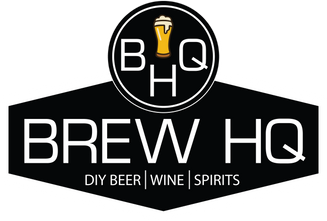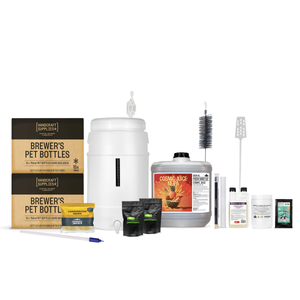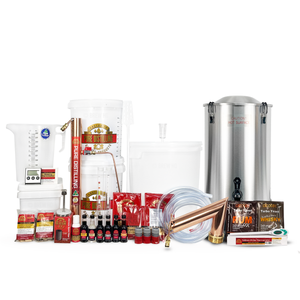
500mL Borosilicate Reagent Bottle
The 500mL Borosilicate Reagent Bottle is comprised of autoclavable laboratory glassware with a lid, making it ideal for simple pasteurization procedures.
This versatile 500mL Borosilicate Reagent Bottle is made from the same material as our Erlenmeyer Flasks and requires no silicone o-ring. It is perfect for boiling and storing wort for your starter, or transporting yeast from yeast starters. To sterilize the wort, simply microwave the bottle and cap it before refrigerating until ready to use. Additionally, the entire bottle can be autoclaved for further sterilization.
Safety warnings:
Contrary to popular belief, Borosilicate glass is not completely unbreakable and impervious to extreme temperature changes. While it does possess a remarkable strength when it comes to sudden shifts in temperature, still, it is important to handle it with caution and care to prevent damage and/or injury.
Cool all glassware slowly to prevent breakage, large, drastic temperature changes causes the glass to fatigue and will shorten the lifespan of the product.
Do not take your boiled flask directly from the stovetop straight into a bath of ice water. While it is possible for some people to use borosilicate glass under extreme conditions without issue, it is not recommended for this purpose. To prevent potential damage, it is important to allow the flask to cool for a few minutes before exposing it to water or placing it in an ice bath. The slower the temperature changes, the longer the glass will be able to withstand them. Rapidly changing from high heat to extreme cold can create significant stress on the glass structure, risking breakage. Although borosilicate glass is generally durable, it is not invincible and may break after repeated exposure to heat and cooling cycles. While it is impossible to accurately predict when this will occur, it is a natural and inherent characteristic of the material.
Please do not boil your flasks dry or dry them out using a stove. The temperature for drying should not exceed 140°C, which a naked flame can easily exceed.
Do not heat glassware that is etched, cracked, chipped, nicked, or scratched. It is more prone to break.
Do not heat glassware directly on electrical heating elements. Excessive stress will be induced in the glass, and this can result in breakage.



